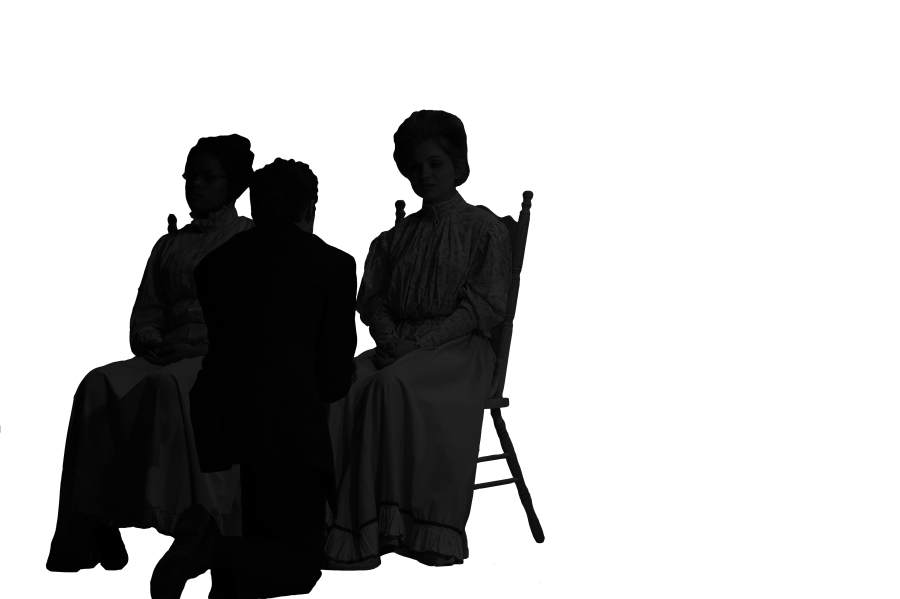Though more than a week has passed since the final show of the upper school winter play, “Our Town,” Coco Kaleel ’20 still finds herself talking about the play with her family and friends. She tells them how she was almost brought to tears and how much she wishes she could see it again.
“I was moved by [the actors’] portrayal of life and death, as well as the emotion the actors put into their scenes,” Kaleel said.
Kaleel is not alone in her response to “Our Town,” a play by Thornton Wilder depicting the daily life and ultimate death of people living in the small New Hampshire town of Grover’s Corners. Performing arts teacher Ted Walch, who directed the play, said he has been receiving emails from both faculty and students about how they felt after seeing the production.
Walch said that one of his favorite emails was one from a student who, like Kaleel, was still thinking about the play even after it was over.
“I got one Wednesday from a kid who said, ‘I can’t shake it. It’s just still inside me and I just wanted you to know that,’” Walch said.
Walch has directed four productions of “Our Town” during his time at Harvard-Westlake, but he said the responses he has gotten from the audience at this most recent production are the best he has received of all time.
“You can tell from the audience reaction that it was very warm, very responsive and deeply moving for lots of people,” Walch said. “It is about the fact that we are all mortal and it actually dares to address the question, ‘What happens after we die?’ I think this generation responded more to some of the deeper philosophical insights that this play has to offer.”
Máté Major ’18, who played the role of Stage Manager, said he was able to connect with the themes of life and death in “Our Town” not in spite of, but because of his youth.
“Being a certified brooding teenager, I contemplate a lot on, ‘What’s the point of all this?’” Major said. “[‘Our Town’] alluded to something greater than myself, and it helped me feel more part of some interconnection between myself and others that I might not have been as aware of.”
Charlotte Weinman ’18, who played the role of Emily Webb, a girl who grows up and gets married in Grover’s Corners, said playing her role made her think more about her own coming of age.
“I think putting this play on with high schoolers is both tricky and necessary,” Weinman said. “We are at times in our lives when we can look back on a lot of development and look forward to a lot more. It makes me look at my own age very differently and has given me another perspective to see things and people from.“
Subjects such as aging are what Weinman said she attributes to the play’s ability to resonate with such a large audience.
“It’s not like the immediate plot points are the most relatable, but the overarching themes of growing up, family relationships, love and mortality are some of the most universal themes out there,” Weinman said. “I think the script in all its awkward, heartbreaking glory really resonates more than you’d imagine at a first glance.”
Like Weinman, Major said the play’s themes were what made it so relatable, regardless of the fact that it takes place over 100 years ago.
“The play did seem distant,” Major said. “But as I got to know it, I realized that what Wilder tapped into was something more profound and a lot more widely applicable.”
Walch said that because the main ideas of the play transcend demographics, “Our Town” represents human society at all points in time and in all communities.
“This play allows all possibilities because the title ‘Our Town’ now comes to mean our town—who we are,” Walch said. “The truths about human beings in the play are absolutely universal, whether they’re male, female, nonbinary, transgender, black, white, Asian or Jewish.”
Because he felt all audiences should be able to connect with the play, Major said he hopes that those who saw “Our Town” leave with a greater appreciation of the time they have while they are alive.
“I hope people gain a greater awareness of every little moment—these little details that surround us that we can never really process fully,” Major said. “[I hope] that people will consequently be a little more aware of their own place in their own world and everyone else’s, and not necessarily contemplate great philosophical questions in every waking moment, but be a bit more present.”
Life in “Our Town”
February 13, 2018





































